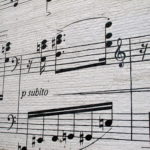By the waters of Babylon,
there we sat down and wept,
when we remembered Zion.
On the willows there we hung up our lyres.
For there our captors required of us songs,
and our tormentors, mirth, saying,
“Sing us one of the songs of Zion!”How shall we sing the LORD’s song in a foreign land?
If I forget you, O Jerusalem, let my right hand forget its skill!
Let my tongue stick to the roof of my mouth,
if I do not remember you,
if I do not set Jerusalem above my highest joy!Remember, O LORD, against the Edomites the day of Jerusalem,
Psalm 137 (ESV)
how they said, “Lay it bare, lay it bare, down to its foundations!”
O daughter of Babylon, doomed to be destroyed,
blessed shall he be who repays you with what you have done to us!
Blessed shall he be who takes your little ones
and dashes them against the rock!
Psalm 137 is one of the most raw and honest songs in the Bible – but it should come with an explicit content warning! How do Christians even sing something like verse 9? (Hint: it goes with verse 8)
But isn’t God love? Doesn’t Jesus say “love your enemies”?
There’s generally five different responses to this and other songs where God’s people curse someone (thanks to Kit Barker who who helpfully summarised these in his Psalms lectures)
- Mock them – Whether it’s the hostile memes from gleeful atheists or quiet rejection from many of our friends, this verse means that the Bible condones violence, glorifies the murder of babies, and can’t be trusted.
- Cut them out – Many prayerbooks and liturgical manuals cut verses 7-9 out of Psalm 137 in their readings. Most Christians just quietly pretend these words don’t exist.
- Acknowledge but don’t use them – For example, C.S. Lewis in his book Reflections on the Psalms writes: “… we must face both facts squarely. The hatred is there–festering, gloating, undisguised–and also we should be wicked if we in any way condoned or approved it, or (worse still) used it to justify similar passions in ourselves.” (p.22)
- Pass through it – For example, in a conversation with U2’s Bono, Eugene Peterson pointed out that psalms like these give us a way to “cuss without cussing”. But he also notes elsewhere that given the shape of the Psalms as a whole, our final destination is praise, not lament.
- Use them in our worship – If Paul is right in 2 Timothy 3:16, and “all scripture is God-breathed and useful for teaching, rebuking, correcting and training in righteousness, so that the servant of God may be thoroughly equipped for every good work”, then perhaps we need to think hard about how to embrace Psalm 137 in our gathered worship.
Where would you sit?
I’m probably between #4 and #5: I think Psalm 137 is a raw but real invitation for God’s people in every generation to weep that we’re in Babylon (amidst evil), to remember our true home in Zion (God’s kingdom), and to ask God to pour out His rage on all evil (now and in future). Because even in the shocking picture of justice coming bathed in the blood of their sons, there is a glimpse of graphic but good news: God’s justice did come for every evil, and it was bathed in the blood of His Son.
(This post is adapted from a sermon I preached on Psalm 137. You can check it out below or on Spotify, Apple podcasts etc.)




